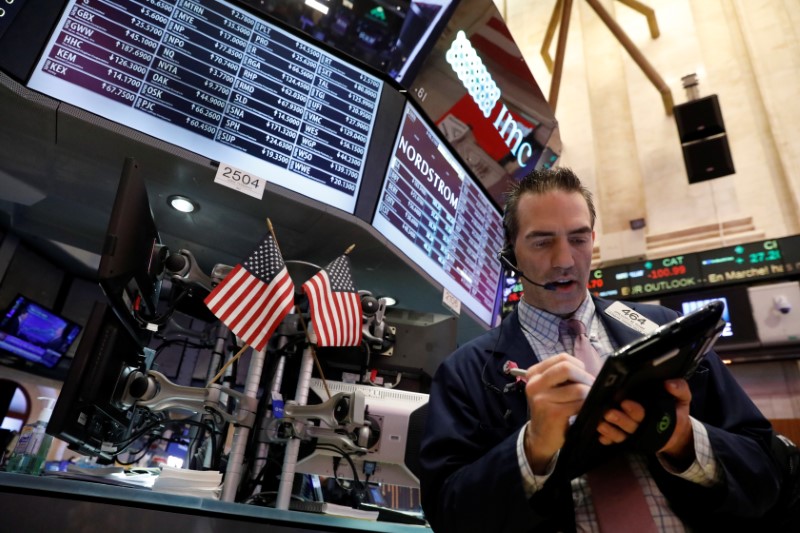By Dion Rabouin
NEW YORK (Reuters) - World stock markets paused near record highs on Friday after underwhelming U.S. retail sales data and worries over China's banking system spurred investors to lock in recent profits and pushed U.S. Treasury yields and the dollar lower.
U.S. stocks dipped and were on track to book losses for the week as weak economic data weighed on financial shares. European equities and emerging markets bourses edged higher to balance the global equity ledger.
MSCI's gauge of world stock markets (MIWD00000PUS) was little changed from its late Thursday close, on track for its first weekly loss in four.
Stocks have been hamstrung by signs of weak consumer spending and waning enthusiasm over a recovery in European corporate earnings.
Concern over risky assets has dominated trading in recent days and sent investors to assets like gold and the Japanese yen after President Donald Trump unexpectedly fired his FBI chief, the potential fallout of which could delay any positive reaction to Trump's proposed pro-growth trade and tax policies.
The benchmark S&P 500 stock index and the Dow edged lower as financial stocks fell, but losses on the Nasdaq were kept in check by a rise in technology shares.
"Today, the focus is on macro news, while the political situation in Washington continues to linger. So we are looking at a cautious market," said Peter Cardillo, chief market economist at First Standard Financial in New York.
The Dow Jones Industrial Average (DJI) fell 40.97 points, or 0.2 percent, to 20,878.45, the S&P 500 (SPX) lost 5.91 points, or 0.25 percent, to 2,388.53 and the Nasdaq Composite (IXIC) added 2.31 points, or 0.04 percent, to 6,118.27.
China's banking regulator this week launched emergency risk assessments of lenders' new business practices, sources told Reuters, as Beijing extended a crackdown on shadow banking.
The dollar index, which tracks the currency against a basket of six major rivals, fell 0.35 percent to 99.228 (DXY).
The dollar's losses tracked a decline in U.S. Treasury yields as increases in domestic retail sales and consumer prices in April fell short of analysts' forecasts, raising doubts about the economy's rebound in the second quarter.
“It's building on a theme of the last several months which is the actual inflation prints on the core are very non-threatening,” said Richard Franulovich, senior currency strategist at Westpac Banking Corp in New York. He was referring to the core CPI’s increase of 1.9 percent year-on-year in April, the smallest gain since October 2015.
“The Fed is still going to be hiking probably two more times this year, but the urgency to act and deliver a hawkish thrust to their actions is not there.”
The yield on benchmark 10-year Treasury notes (US10YT=RR) was down about 7 basis points at 2.33 percent, while the 30-year yield (US30YT=RR) was 5 basis points lower at 2.99 percent.
In Europe, stock markets steadied this week. Their outperformance this year against global peers remains intact, with the benchmark's (STOXX) 10 percent gains outpacing the 7 percent rise on the S&P 500 (SPX).
Emerging markets bourses continued their outperformance as well, with MSCI's emerging markets index (MSCIEF) rising 0.2 percent to a fresh two-year high. The gauge has posted year-to-date gains of more than 15 percent.
Oil prices were little changed, on pace for their biggest gain in five weeks as traders expected OPEC-led production cuts to extend beyond the middle of this year and as U.S. crude inventories fell to their lowest levels since February.
International Brent crude futures (LCOc1) stood at $50.74 per barrel. U.S. West Texas Intermediate crude futures (CLc1) were at $47.76 per barrel.
Gold <XAU=> rose 0.3 percent to $1227 an ounce. Copper
